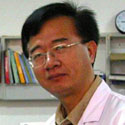Advisory Board and Editors Biological Oceanography

Linsheng Song
Professor of Marine Biology and Vice President of Dalian Ocean University. Member of council of the Chinese Society of Malacology, fellow of the Chinese Society for Oceanology and Limnology. Editorial Board Member of Fish & Shellfish Immnology, Developmental and Comparative Immunology, Scientific Report.

John J. Stegeman
Sr. Scientist and former Head of Biology and Watson Chair, Woods Hole Oceanographic Institution. Director, NSF/NIH Woods Hole Center for Oceans and Human Health. Editorial Boards of several journals, former Editor-in-Chief, Aquatic Toxicology. Honorary Doctorate from Goteborg University.

Marcelino T Suzuki
I am from Brazil, where I obtained a degree in Oceanography from the Univ. do Rio Grande. I then finished a Masters and a PhD in Oceanography at Oregon State Univ under the co-supervision of Ev and Barry Sherr and Steve Giovannoni working on the effects of protist bacterivory on bacterioplankton community structure. Next I worked at the Monterey Bay Aquarium Research Inst. supervised by Ed DeLong on topics including the analysis of bacterioplankton (BP) diversity, the development of real-time PCR for genes and mRNAs, and BP metagenomics, and the biology of photoheterotrophs in the Ocean. I was hired as an Assistant Professor at the Chesapeake Biological Lab where I led research on the diversity, phylogeny and activity of BP, measurements of PB gene expression in situ biology and microbial processes leading to methylmercury production by bacteria.
Since May 2009, I am a Professor At the Observatoire Océanologique de Banyuls and the head of the Microbial Biodiversity and Biotechnology Unit and the Scientific advisor of the Bio2Mar platform of the OOB. I lead research on the biology of photoheterotrophs in the Ocean, and the ecology and genomics of, and the exploitation of, marine microorganisms for biotechnological purposes. My main interests are the connection betweem specific bacterioplankton activity and marine biogeochemical cycles, microbial biotechnology, the biology of photoheterotrophy, and chemical interactions of microbes in symbiosis.

Fabiano Thompson
Oceanographer and Professor of Marine Biology of the Institute of Biology and SAGE-COPPE of the Federal University of Rio de Janeiro (UFRJ). Our research group focuses mainly on marine microbiology.

Robert J Toonen
Research professor of Marine Biology at the Hawaii Institute of Marine Biology in the School of Ocean & Earth Sciences & Technology at the University of Hawaii at Manoa.

Georg Umgiesser
Georg Umgiesser has two masters degrees in oceanography and physics and a PhD in biomedical sciences. He is working at the CNR as a senior scientist.
Principal fields of investigation are hydrodynamic modeling, circulation and sediment transport. He has developed a series of finite element models for shallow water bodies (SHYFEM) for the study of hydrodynamic processes, water quality and transport phenomena. He has participated in various EU projects dealing with the North Sea and the Mediterranean, turbulence studies and application of 3D models. He was a visiting professor at the Kyushu University, Japan. He is also lead researcher at the Open Access Center of Klaipeda University. He is the Italian coordinator of the ESFRI project Danubius-RI dealing with study on river-sea systems.

Claudio Vasapollo
I am a marine biologist working as a fishery and benthic researcher at the Institute for Marine Resources and Biotechnologies (IRBIM) of the National Researche Council (CNR) in Ancona, Italy. I held my PhD in 2010 at the The Open University (Milton Keynes, UK) working at the Stazione Zoologica A. Dohrn of Naples (Italy) where I conducted a study on the spatial and temporal distribution of macro benthic assemblages associated to Posidonia oceanica seagrass and on several features of the plant itself. I got a Master degree in 2005 at the Polytechnic University of Marche after the Bachelor's degree in Marine Biology at the same university in 2004. I participated in several surveys at sea in the last years as well as to several diving expeditions in the Indian Ocean and Mediterranean Sea.

Scott Veirs
Oceanographer and bioacoustician facilitating the recovery of endangered regional icons of the Pacific Northwest (U.S.), particularly southern resident killer whales and Pacific salmon. I helped design and was the first major in the Earth Systems program at Stanford University, then earned a M.S. and PhD in Oceanography at the University of Washington. In 2003 I founded Beam Reach and taught ~50 undergraduates and recent graduates to ask and answer their own marine field science questions during 10-week field courses from 2005-2012. During the same period I helped create the Salish Sea Hydrophone Network -- orcasound.net -- which I continue to administer.

Balu Alagar Venmathi Maran
Dr. Balu Alagar Venmathi Maran, Ph.D.
Associate Professor, Graduate School of Integrated Science and Technology, Nagasaki University, Japan
Dr. Balu Alagar Venmathi Maran is an Associate Professor at the Graduate School of Integrated Science and Technology, Nagasaki University, Japan. He previously served as an Associate Professor at the Borneo Marine Research Institute, Universiti Malaysia Sabah (UMS), Malaysia, from 2017 to 2023. Before that, he was a Research Professor at Chonnam National University, Pukyong National University, and Kyungpook National University, South Korea (2015–2017) and a Scientist at the Korean Institute of Ocean Science and Technology, Busan, South Korea (2011–2015).
Dr. Venmathi Maran earned his Ph.D. in Marine Biology from Hiroshima University, Japan, and has 25 years of research experience in marine science and aquaculture. His expertise includes the taxonomy of marine fish parasites and the application of natural products for parasite control in aquaculture. Additionally, his research focuses on jellyfish biodiversity, harmful jellyfish toxins, and the potential of jellyfish collagen in cosmetics.
Currently, he is engaged in a marine science and technology project utilizing artificial intelligence in biological imaging. His significant contributions to research and innovation have been recognized with multiple awards and gold medals from UMS.
Dr. Venmathi Maran has authored over 100 research articles, 10 book chapters, and has edited three books published by Springer and UMS Press. As the principal investigator of several research projects, including an international project on marine biodiversity, he plays a key role in advancing marine research.
Additionally, he serves as an Academic Editor for PeerJ (Q1), International Journal of Microbiology (Wiley), and Diversity (MDPI) as a Guest Editor, along with several other scientific journals.

Olja Vidjak
Dr. Olja Vidjak's educational background includes an MSc in Oceanology (1998) and a PhD in Biology (2004) from the University of Zagreb, Croatia. She is a researcher at the Institute of Oceanography and Fisheries (Croatia), with primary specialization in the ecology and taxonomy of marine zooplankton. Her research interests include the spread and management of aquatic non-native species and marine biodiversity conservation.

Jianjun Wang
Dr. Jianjun Wang is Professor of Nanjing Institute of Geography and Limnology, Chinese Academy of Sciences. He studies microbial biogeography and global change. His main topics are related to the questions on how microbial diversity and community composition varied within Earth’s surface and subsurface, especially aquatic environments. He is using self-obtained large microbial data sets, in-situ experiments, as well as modeling methods to achieve these answers.

Ingrid M Weiss
Professor for Biobased Materials at IBBS - Institute of Biomaterials and Biomolecular Systems, University of Stuttgart, Germany.
Past Head of Biomineralization at INM – Leibniz Institute for New Materials, Saarbrücken, Germany and Private Lecturer "Biochemistry" at the University of Regensburg, Germany.

